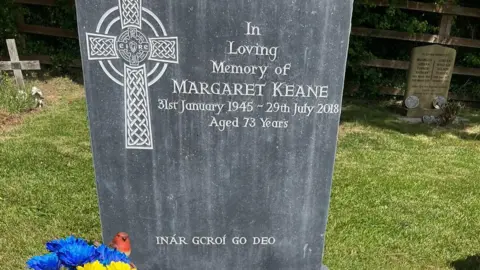Margaret Keane: Fontaines DC meet family at grave that inspired song
 BBC
BBCPost-punks Fontaines DC have combined an appearance at BBC Radio 1's Big Weekend in Coventry with a visit to the grave that inspired one of their songs.
Margaret Keane's family fought to have "In ár gCroíthe go deo", which means "in our hearts forever" in Irish, inscribed on her gravestone in Exhall.
The Church of England had opposed it on the grounds may be seen as political.
The Dublin band said the family's fight meant "so much to us, especially as Irish people over in England".
Bernadette Martin, daughter of Margaret Keane, and her family, successfully fought for the right to have a Celtic cross bearing the words on her mother's grave at St Giles Church in Exhall.
'Very important'
She told the BBC in April that the song inspired by the case was "a fitting end to the journey that we went on as a family".
"It was just the last thing we could have ever expected," she said.
"When we heard it, the first thing we did, me and my sisters, was to stand at my mum's grave and play it to her and listen to it for the first time at that special place."
Allow X content?
The band, who played at the event in Coventry's War Memorial Park earlier, met the family at Mrs Keane's grave.
Guitarist Carlos O'Connell told BBC CWR it was "amazing to meet them and to hear their story from them as well".
"What they wanted to do, they wanted to portray Irish people in a certain way and that was so moving to us, it means so much to us, especially as Irish people over in England."
He said the band's latest album Skinty Fia, which opens with the track named after the inscription, explored questions of identity and being in a foreign country, something they felt was summed up by the family's story.
He said that "to have your own inscription on your grave being denied because of a twisted view of the past, and for that to be happening still now, is just devastating", adding: "Their fight was very important."

Follow BBC West Midlands on Facebook, Twitter and Instagram. Send your story ideas to: newsonline.westmidlands@bbc.co.uk